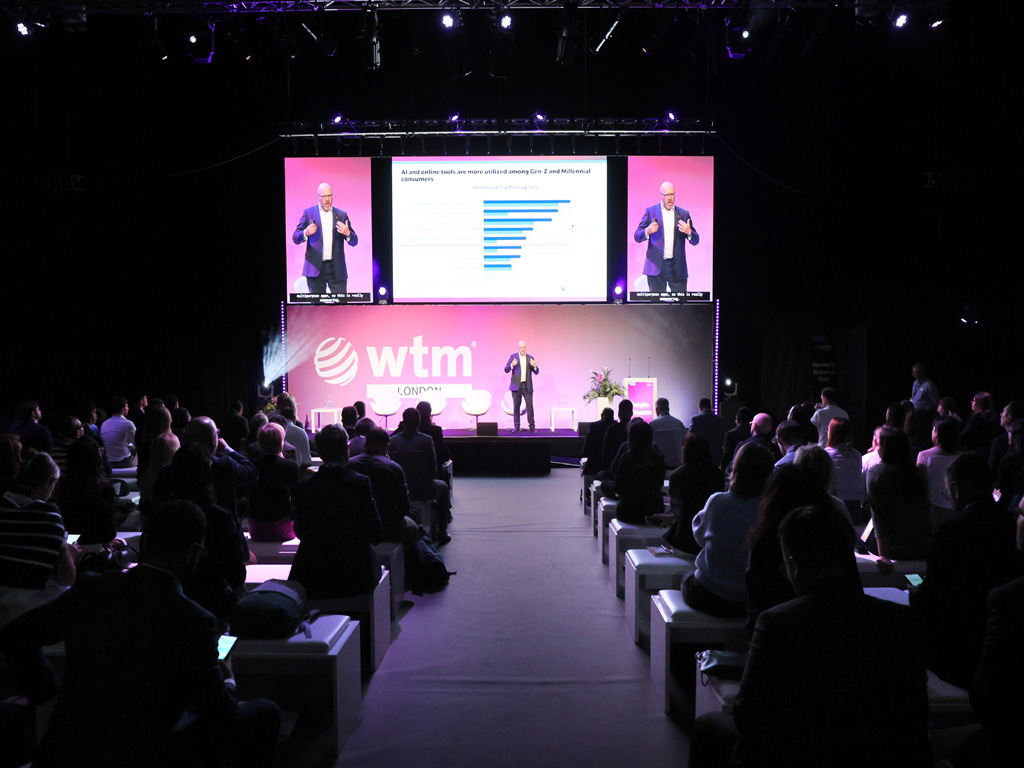Artificial intelligence is a net positive for travel, according to a show-of-hands after a lively debate which rounded off the Technology Summit at this year’s WTM London. The role of AI in travel was debated by two teams of three. Those agreeing with the proposition – AI is the enemy of travel – were led by Stephen Joyce from Protect Group, with the dissenters led by Christian Watts of Magpie Travel.
Reservations about AI were that it is not accurate and therefore not trustworthy. As Joyce noted, trips curated by AI “remove the magical human chaos of being somewhere new”.
In contrast, the advocates of AI pointed out that travellers are already using AI, despite the well-documented errors. AI liberates people working in the industry from admin and can help suggest alternative destinations and improve the in-destination experience for travellers. The show of hands was overwhelmingly in favour of AI. Watts joked that it was “a tough day for the humans” but added that the audience response probably reflected “not where it is today, but where it’s going to be in the future”.
AI was a recurring theme across the sessions. James Spalding from Trip.com shared that the OTA has a global, AI-enabled customer support strategy that is adapted for different markets. Trip.com allows its AI autonomy to answer basic queries, but the AI is also trained not only to identify the complexity of the query but also to engage and respond in the right tone. The AI knows (or has learnt) when to hand the query over to a human to resolve the issue.
Elsewhere, other takes on AI’s role in travel were revealed; Qais Amori from Almosafer talked about AI’s fraud detection capabilities (when the fraudsters themselves are using AI); Melissa Skluzacek from easyJet said that AI is used across all its commercial and operational functions and is seen as an extra pair of hands; Sally Bunnell from NaviSavi explained how it is using AI to help curate, tag and profile its user generated content, with embedded booking options, to make it usable by brands who want to license it.
The summit started off with a bigger picture overview by Dave Goodger from Tourism Economics. He shared data from the WTM Global Trends Report 2025 which showed that three in ten travellers think AI will increase their average spend. His introduction also highlighted that travel’s growth profile is positive, affording AI the chance to positively impact even more travellers and businesses.
One business benefitting from travel’s growth is global eSIM provider, Holafly, WTM London’s official Technology Partner. Its CEO Pablo Gómez Fernandez-Quintanilla noted a convergence of trends – more international travel, the need to be connected, hybrid work, seamlessness – were driving the business forward.
Back to AI, Filip Filipov from OAG identified a potential major headache which resonated with a travel tech audience. The last of his 30-slides-in-300-seconds presentation addressed look-to-book ratios. OTAs currently gets one booking for every thousand views, he suggested. Looking ahead, large language learning models could return a look-to-book ratio of 60,000 to 1. When agentic AI becomes mainstream, he warned that this could be one million to one.
While AI was always likely to dominate proceedings, personalisation was another recurring theme. Many panellists were keen to point out the difference between personalization and contextualisation – the idea that it is as important for travel companies to know why someone is travelling as well as who they are.
The Technology Summit was organised by Timothy O’Neil Dunne, WTM London’s technology conference advisor, from consultancy T2Impact. He said: “Travel’s got a lot on its plate – war, disease, Trump – at the same time as generative AI is shaking up how we search, plan and experience travel, with agentic AI beavering away at the back.
“The Summit addressed many of these issues head on. The main takeaway from across all the panellists and sessions is that while disruptive change is inevitable, the travel technology industry is committed to making travel better for real people.”


